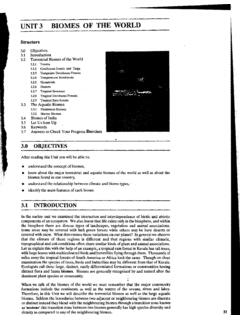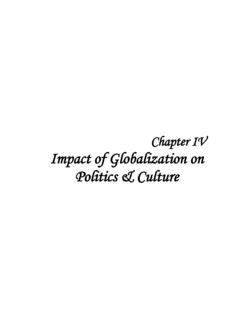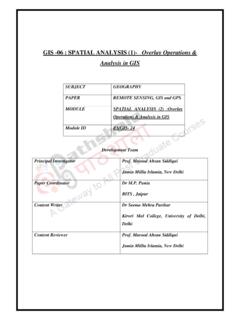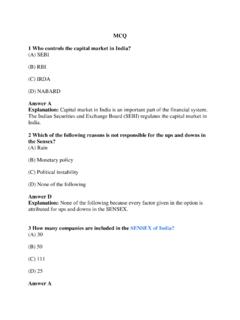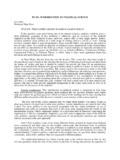Transcription of Unit 1: Introduction to Educational Psychology
1 1 Educational Psychology Unit 1: Introduction to Educational Psychology (Handout I). What is Psychology ? The word, Psychology ' is derived from two Greek words, Psyche' and Logos'. Psyche means soul' and Logos' means science'. Thus Psychology was first defined as the science of soul . Psychology as the Science of Soul. In ancient days, the Greek philosophers like Plato and Aristotle interpreted Psychology as the science of the soul and studied it as a branch of Philosophy. But soul is something metaphysical. It cannot be seen, observed and touched and we cannot make scientific experiments on soul.
2 Psychology as the Science of the Mind. It was the German philosopher Emmanuel Kant who defined Psychology as the science of the mind. William James (1892) defined Psychology as the science of mental processes. But the word mind' is also quite ambiguous as there was confusion regarding the nature and functions of mind. Psychology as the Science of Consciousness. Modern psychologists defined Psychology as the Science of Consciousness . James Sully (1884) defined Psychology as the Science of the Inner World . Wilhelm Wundt (1892) defined Psychology as the science which studies the internal experiences'.
3 But there are three levels of consciousness conscious, subconscious and the unconscious and so this definition also was not accepted by some. Psychology as the Science of Behaviour. At the beginning of the 20th century, when psychologists attempted to develop Psychology into a pure science, it came to be defined as the science of behaviour. The term behaviour was popularized by Watson. Other exponents are William McDugall and Pillsbury. According to Woodworth, First Psychology lost its soul, then it lost its mind, then lost its consciousness. It still has behaviour of a sort.
4 Definitions of Psychology Skinner defined, Psychology is the science of behaviour and experience. Crow and Crow, Psychology is the study of human behaviour and human relationships. William Mc Dougall, Psychology is the science which aims to give us better understanding and control of 2 Educational Psychology the behaviour of the organism as a whole. Kurt Koffka, Psychology is the scientific study of the behaviour of living creatures in their contact with the outer world.. Meaning of Educational Psychology Educational Psychology is one of the branches of Psychology to study the behaviour of the learner in relation to his education.
5 As specialized branch of Psychology concerns itself with suggesting ways and means of improving the process and products of education, enabling the teacher to teach effectively and the learners to learn effectively with the minimum effort. It is thus designated as the service of education. It has simplified the tasks and improved the efficiency of the teacher or all those connected in the process and products of education by supplying them with the essential knowledge and skills in much need the same way as science and technology has helped in making possible maximum output through minimum input in terms of time and labour in our day-to-day activities.
6 Educational Psychology is that branch of Psychology which deals with the application of psychological findings in the field of education. In other words it deals with the human behaviour in Educational situations. It is the systematic study of the development of the individual in the Educational settings. It is the scientific study of human behaviour by which it can be understood, predicated and directed by education to achieve goals of life. Definitions of Educational Psychology Skinner: Educational Psychology is the branch of Psychology which deals with teaching and learning.
7 Crow and Crow: Educational Psychology describes and explains learning experience of an individual from birth to old age . E. A. Peel: Educational Psychology is the science of education . Trow describes, Educational Psychology is the study of psychological aspects of Educational situations . Stephens says, Educational Psychology is the study of Educational growth and development . Judd describes Educational Psychology as, a scientific study of the life stages in the development of an individual from the time he is born until he becomes an adult.
8 In the words of Peel, Educational Psychology helps the teacher to understand the development of his pupils, the range and limits of their capacities, the processes by which they learn and their social relationships.. 3 Educational Psychology (In this way, the work of the Educational Psychologist resembles with that of an Engineer, who is a technical expert. The Engineer supplies all the knowledge and skill essential for the accomplishment of the job satisfactorily for example, construction of a bridge.). In the same way Educational Psychologists, who is a technical expert in the field of Education, supplies all the information, principles and techniques essential for: Understanding the behaviour of the pupil in response to Educational environment and Desired modification of his behaviour to bring an all-round development of his personality.
9 Thus, Educational Psychology concerned primarily with understanding the processes of teaching and learning that take place within formal environments and developing ways of improving those methods. It covers important topics like learning theories; teaching methods;. motivation; cognitive, emotional, and moral development; and parent-child relationships etc. In short, it is the scientific discipline that addresses the questions: Why do some students learn more than others? and What can be done to improve that learning? . The Nature of Educational Psychology : Its nature is scientific as it has been accepted that it is a Science of Education.
10 We can summarize the nature of Educational Psychology in the following ways: 1. Educational Psychology is a science. (Science is a branch of study concerned with observation of facts and establishment of verifiable general laws. Science employs certain objective methods for the collection of data. It has its objectives of understanding, explaining, predicting and control of facts.) Like any other science, Educational Psychology has also developed objective methods of collection of data. It also aims at understanding, predicting and controlling human behaviour.

